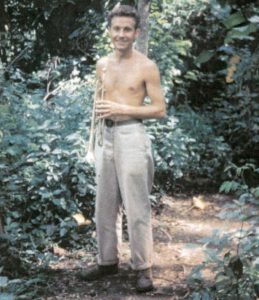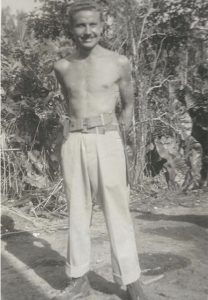After 75 years, the 746th Far East Air Force Band released an album
In January of 1946, in a camp outside Manila in the Philippines, the 746th Far East Air Force Band was breaking up.
Unlike most band breakups, it wasn’t due to a fight. In this case it was exactly the opposite; the fighting had stopped. The 746th FEAF had entertained the troops on the Pacific Theater front lines throughout World War II, but Japan had formally surrendered about five months earlier, and military operations were winding down.
One major lesson the United States Army learned from World War I was that keeping troop morale up was crucial. Unfortunately, in the early to mid-1940s, there weren’t a lot of ways to do that. Armed Services editions of books—small copies that were easy to carry and store—were popular. But most crucial were USO camp shows and live music from the newly formed Army Air Force’s bands, which gave the troops a taste of home and a break from the war.
This was one of the lessons learned by Jason Burt of Sacramento, who turned a long-lost recording by those musicians that he found in his grandfather’s house into an album that he hopes earns a Best Historical Album nomination ahead of the 2022 Grammy Awards.
“My family gave them to me, and I thought, ‘What am I going to do with these records? Do they even work?'” Burt said. “A couple months went by, and I found myself with some time because of COVID, so I played them. It evolved from there into researching to see how unique it was to have recordings of a front line band unit, let alone a whole album.”

Air Force PVT Richard Burt photographed in the Luzon Jungle, at a camp north of Manila, the Philippines, practicing with the 746th Far East Air Force Band. Courtesy Jason Burt.
Back in 1946, playing music was soon to be behind the 746th Far East Air Force Band. A few members of the band had already gone home, and more were leaving soon. For the moment, though, they were still practicing. There were still troops, and with the war over, there was plenty to celebrate. And that day’s practice was special.
A special services unit was at the camp and happened to have a new gadget with them: a portable wire recorder. The predecessor to magnetic tape, the technology had been around for decades but had just recently become commercially available and small enough to carry. The band had never had a chance to be recorded before and almost certainly wouldn’t have a chance again, so the musicians put the recorder and a single microphone in front of them and played their regular set.
Private First Class Richard Burt, the band’s lead trumpet player, asked his commanding officer if he could take the recordings home. He had solos on several of the songs and thought it would be a nice keepsake. He got permission, brought them back, put them on three records and kept them in a box in his basement.
Burt didn’t stop playing when he got home. After the war, he trained at Juilliard and later went on to spend 27 years as a music teacher in West Sacramento. When he died in 2016 at age 92, he had four children, 12 grandchildren and five great-grandchildren.
One of those grandchildren, Jason Burt, grew up hearing stories about his grandpa’s time playing the trumpet in the war. He knew there were records, but he had never seen or heard them; they had never turned up. But in 2019, while cleaning out his grandparents’ house, the family found the records in the attic.
Burt, a middle school history teacher, contacted other historians to ask if anything else like the records existed. Everyone from academics to the World War II Museum told him they had never heard of anything like it. That’s how he became a first-time music producer.
The uniqueness led him to decide that it was something he needed to put out into the world as an homage, not just to his grandfather, but to all the front line bands of the war.
“I just felt like I needed to tell these guys’ story, of being in the Philippines and playing shows on the front line at times,” he said.
The result is Sentimental Journey, a proper album release of the 746th FEAF’s music, produced by Burt, Grammy-winner Reuben Cohen and Grammy-nominated Hiroyuki Sanada.
Thanks to a project the elder Burt undertook in the ’80s to document his life, Jason was able to include some of those stories in his grandfather’s own words on the album. The final track on Sentimental Journey is half an hour of stories told by Richard Burt himself, driving home what it was like to be a musician at war.
“They were behind the lines playing shows, and it would end up being the front lines, because that’s just how the war was on these islands,” Jason Burt said. “One of their first shows was on Leyte. They’re doing the show with a USO group—my grandpa talks about this on the narration track—and suddenly fighting breaks out directly behind them.
“Think about it: You’re up there playing a show for the first time with these guys you were assigned to a band with. You’re playing for guys who are miles away from home, and they have rifles; they’re not going to be afraid to tell you what they think of your musicianship,” he said. “Then on top of that, fighting breaks out right behind you. It’s gotta be a ton of pressure.”
After the war, the members of the band went their separate ways and had different levels of success with their musical careers. In addition to Richard Burt’s teaching career the 746th’s CO played with the Kay Kyser Orchestra. Another was an accordionist in Roy Rogers’ band and appeared in a couple westerns.
“Every person I tracked down, music was a part of their life even after the war,” Jason Burt said. “Nobody got extremely famous but they still played. One guy had an instrument store and played gigs at Disneyland, stuff like that. Music was a part of their whole lives after the war.”
Follow editor Daniel J. Willis at Twitter.com/BayAreaData.

